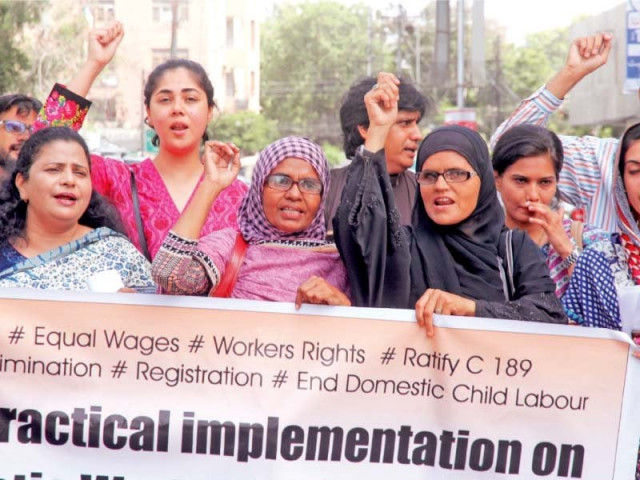Domestic workers stuck in poverty
Marginalised caretakers: No minimum wage law exists for unskilled labourers

Where high inflation has already incapacitated destitute families, low wages and high travel costs have further exacerbated the crisis for domestic workers, who find themselves trapped in a vicious cycle of poverty.
As per a report published by the International Labor Organization (ILO), Pakistan is home to almost 8.5 million domestic workers, with women comprising more than half of the informal labour force.
Despite the presence of such a large workforce involved in duties ranging from cleaning and cooking to childcare and elderly care, domestic workers are not entitled to benefits, like the minimum wage, which under the prevalent labour law of the country, is only preserved for other workers.
In the absence of a fixed minimum wage, many women receive only a pittance for their blood and sweat, which is insufficient to accommodate monthly rents, travel costs, and other household expenditures.
“I cook, clean, and iron clothes for two houses, but both combined pay me only Rs 24000, out of which Rs 8,000 goes for rent and Rs 3,000 is spent on travel.
Leaving me and my four children to survive on Rs 13,000 for the entire month,” protested Samina, a lone breadwinner from Kahna, working as a domestic worker in the Central Park Housing Society.
Speaking to The Express Tribune, the Secretary General of the Pakistan Domestic Labor Union, Arooma Shahzad, highlighted the repercussions of the absence of a minimum wage on female domestic workers, whose future generations too get trapped in the cycle of poverty.
“Even though maids working in areas like DHA and Bahria Town are paid a higher wage, a majority of them only receive a pittance, which means that most of them cannot afford to send their children to school, thereby rendering it highly likely that their next generation will also become domestic workers.” In their efforts to escape this vicious cycle of intergenerational poverty, many domestic workers have started contesting their wages with their employers.
One such case is of Ghazal Zaib, whose maid started demanding Rs 3,000 more for her monthly salary, despite working on a fixed salary for many years.
Acknowledging the plight of the domestic workers, Arooma Shehzad claimed that talks were underway for domestic workers to receive free medical treatment in order to alleviate some of their financial burden.
When questioned about the plight of domestic workers, the Spokesman for the Punjab Labor Department, informed: “The Punjab Domestic Labor Act approved in 2019, prioritises the welfare of our domestic workers and ensures that the minimum wage is fixed at Rs 25,000 per month and that workers are guaranteed paid annual leaves and fixed working hours.
However, the statement drew scepticism from the Domestic Labour Union given the fact that the Punjab Domestic Labor Act has been awaiting implementation for the past four years.


















COMMENTS
Comments are moderated and generally will be posted if they are on-topic and not abusive.
For more information, please see our Comments FAQ